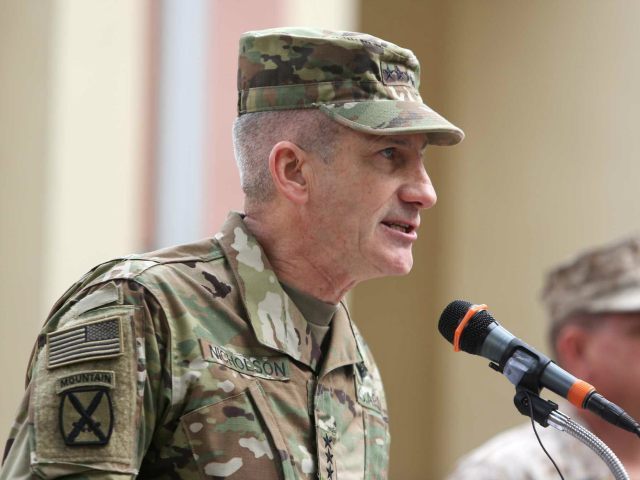Taliban jihadists “cannot win” under the level of pressure U.S. President Donald Trump’s strategy is applying on the terrorist group, declared Gen. John Nicholson, the top commander of American-NATO forces in Afghanistan, this week.
Referring to the strategy’s impact so far, the American general told Pentagon reporters via teleconference from Kabul, “In the face of this pressure, the Taliban cannot win. Their choices are to reconcile, live in irrelevance, or die.”
He stressed that the main goal of Trump’s South Asia strategy is to “pressure” the Taliban into “reconciliation, a negotiated settlement which lowers the level of violence.”
“Reconciliation will take some time,” acknowledged Nicholson, predicting that the increased U.S. involvement “will maintain a tempo that will enable [Afghan security forces] to start retaking 80 percent of the country over the next two years.”
This year, the Long War Journal and the U.S. Inspector General for Afghanistan Reconstruction (SIGAR) reported that terrorist groups, primarily the Taliban, control or contest about 45 percent of Afghanistan.
Gen. Nicholson said the Taliban alone controls or contests 36 percent of the country, suggesting that the Afghan government has regained control of more territory since the SIGAR and Long War Journal assessments.
The South Asia strategy is already having an impact, nearly 100 days after President Trump announced it in August, declared the commander.
Marking a significant departure from the policy of previous administrations, President Trump has authorized Nicholson to target the Taliban’s production of opium and its deadly heroin derivative, described by the commander as the group’s “economic engine” that allows it to wage an unrelenting war.
The top U.S. general explained:
We believe that the Taliban, in some ways, have evolved into a criminal or narco-insurgency. They are fighting to defend their revenue streams. They have increasingly lost whatever ideological anchor they once had.
They fight to preserve and expand their sources of revenue. This includes narcotics trafficking, illegal mining, taxing people throughout Afghanistan, kidnapping, and murder-for-hire: all criminal endeavors.
Recent U.S. airstrikes targeting opium “cartels” in the terrorist group’s Helmand province stronghold have deprived the Taliban alone of “between $7 million and $10 million of revenue,” the general told reporters.
“The overall cost to [all] the drug trafficking organizations [in the region] approached $48 million dollars. So these strikes were just the first step in attacking the Taliban’s financial engine, and they will continue,” said Nicholson, later adding:
This is a war on Taliban revenue. So, there’s about 13 drug trafficking organizations in Afghanistan, seven of them connected to the Taliban in Helmand alone. And so, we are striking those specific organizations that are linked to the Taliban, Taliban cartels if you will, that now provide the majority of their revenue.
Gen. Nicholson has said in the past that the Taliban generates 60 percent of its overall revenue, estimated at $400 million, from the illicit opium business.
According to the United Nations’ latest assessment, the Taliban stronghold of Helmand remains the top poppy producing region in Afghanistan, the world’s top supplier of opium and heroin.
In 2016, opium production reached record levels (9,000 metric tons), nearly doubling the figures from the previous year.
Considered one of his first major Afghan war decisions after becoming president in 2009, Barack Obama oversaw the end of the main U.S.-led opium eradication effort.
By 2016, opium cultivation and heroin production had reached historic proportions, providing the Taliban with a lucrative source of revenue to fund its terrorist operations.
Meanwhile, eradication activity had dropped by more than 90 percent that year.
Gen. Nicholson acknowledged that problems persist in Afghanistan, including Pakistan’s uninterrupted support for terrorist groups and the “greater risk” associated with the enhanced participation of American advisers in the war.
Moreover, the Taliban reportedly continues to maintain a “close relationship” with al-Qaeda more than 16 years after the United States invaded the country to defeat the two groups in response to the 9/11 attacks.
“We still see is a degree of collaboration going on between al-Qaida and the Taliban,” he said. “So even though the Taliban will not publicly acknowledge the relationship, what we see at the tactical level is still a close relationship.”

COMMENTS
Please let us know if you're having issues with commenting.